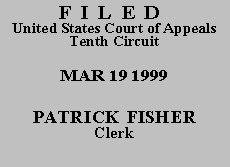

| GARY EARL BYERS,
Petitioner-Appellant, v. H.N. SCOTT; THE ATTORNEY GENERAL OF THE STATE OF OKLAHOMA, Respondents-Appellees. |
|
Petitioner Gary Earl Byers, an Oklahoma state inmate convicted of driving under the influence of alcohol and subornation of perjury, seeks a certificate of appealability to appeal the district court's denial of his petition for a writ of habeas corpus filed pursuant to 28 U.S.C. § 2254. In order to show entitlement to a certificate of appealability, an appellant must make "a substantial showing of the denial of a constitutional right." 28 U.S.C. § 2253(c)(2). This standard is met by a showing that the issues raised "are debatable among jurists, or that a court could resolve the issues differently, or that the questions deserve further proceedings." United States v. Sistrunk, 111 F.3d 91, 91 (10th Cir. 1997).
Petitioner was found alone at the scene of a one-car automobile accident on July 24, 1992. He was hospitalized and later charged with driving under the influence of alcohol (DUI). At the preliminary hearing, an individual named Greg Wheelbarger testified that he, not petitioner, had been driving the automobile and that he had fled before the accident was discovered. Mr. Wheelbarger recanted this admission after a discussion with the district attorney.
At trial, facing DUI and subornation of perjury charges, petitioner continued to assert that he was not the driver of the car. Mr. Wheelbarger testified that he had not been with petitioner at the time of the accident, but that he had accepted petitioner's offer of a $1,500 payment in exchange for false testimony. Petitioner was convicted and sentenced to five years for DUI and twenty years for subornation of perjury, with the sentences to run consecutively.
In the petition filed in district court, Mr. Byers asserted that he is entitled to federal habeas relief for several reasons. Four of his contentions relate to the right to a fair trial: (1) the change in Mr. Wheelbarger's testimony, which Mr. Byers attributes to threats on the part of the district attorney; (2) the absence of corroboration for Mr. Wheelbarger's testimony on the subornation of perjury count; (3) the lack of a cautionary jury instruction on the unreliability of informant testimony; and (4) the giving of a jury instruction allowing the conviction of Petitioner as an habitual offender. Petitioner also claimed that he was denied effective assistance of trial and appellate counsel and that there was insufficient evidence to support his DUI conviction.
The district court, adopting the report and recommendation of the United States magistrate judge, determined that the claim of insufficient evidence on the DUI count was procedurally barred and that the remaining claims lacked merit. It denied the petition for habeas relief and, subsequently, petitioner's request for a certificate of appealability. After a review of the record, we agree with the district court.
Because we conclude that petitioner has not made a substantial showing of the denial of a constitutional right, we DENY his request for a certificate of appealability and DISMISS the appeal. The motion for in forma paupers status is denied as moot. The mandate shall issue forthwith.
Entered for the Court
Circuit Judge
*. This order and judgment is not binding precedent, except under the doctrines of law of the case, res judicata, and collateral estoppel. The court generally disfavors the citation of orders and judgments; nevertheless, an order and judgment may be cited under the terms and conditions of 10th Cir. R. 36.3.